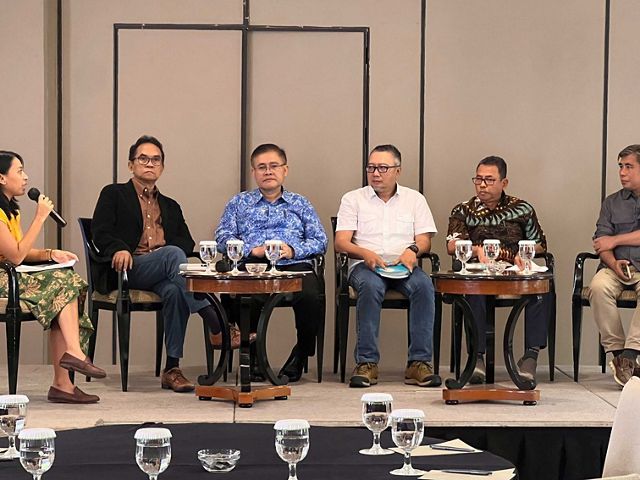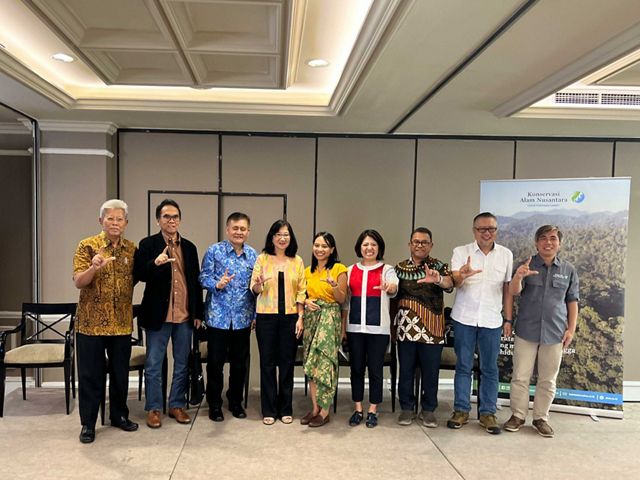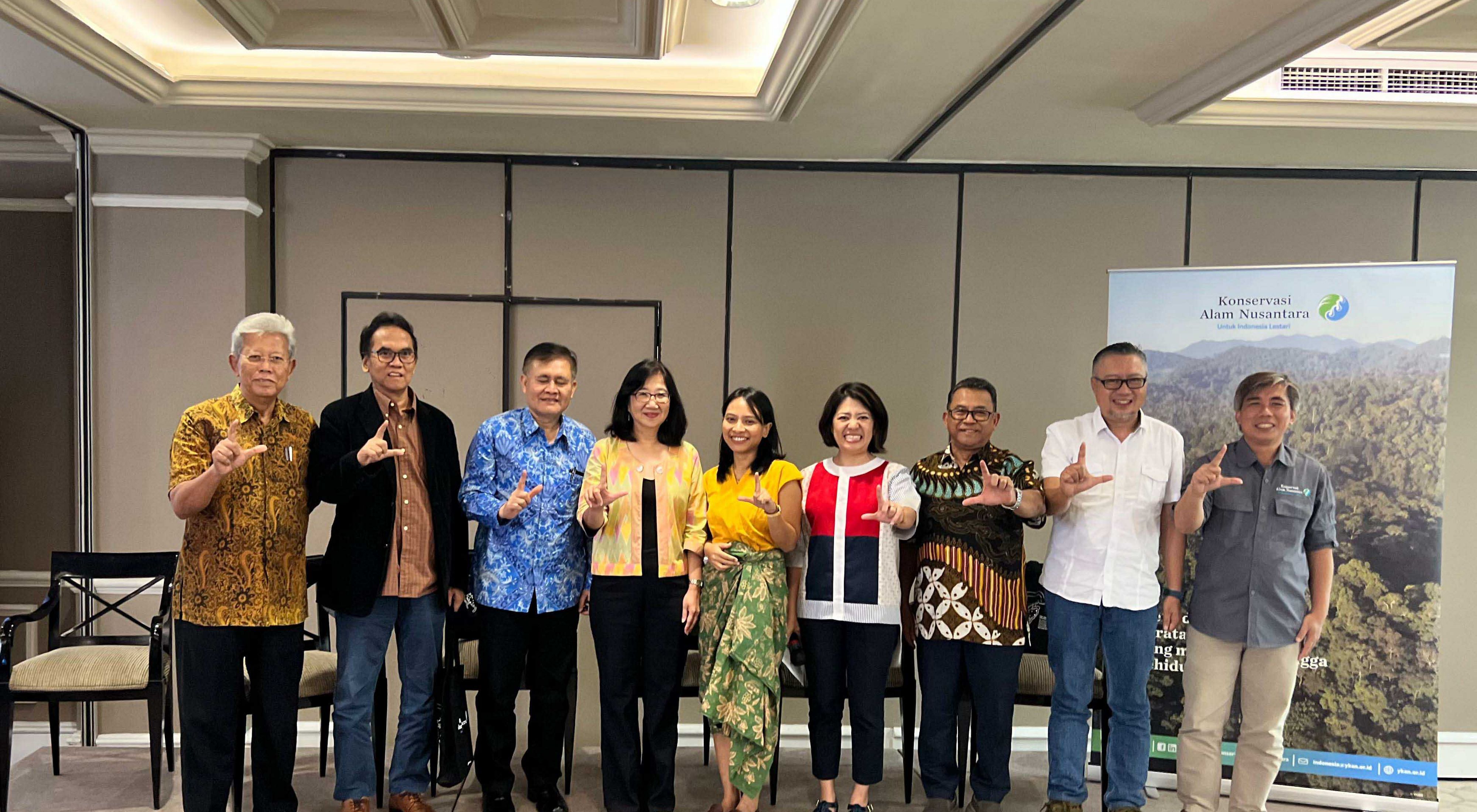Sustainable Management of Natural Forest Production Towards Achieving The 2030 Folu Net Sink Target
Media Contacts
-
Maria Adityasari
Communications Specialist YKAN
Yayasan Konservasi Alam Nusantara
Email: maria.adityasari@ykan.or.id
By implementing a sustainable business model, Natural Forest Business Permit (PBPH) holders have the opportunity to contribute to balancing ecological and economic needs. Sustainable forest management practices can reduce greenhouse gas emissions, protect areas of high conservation value and biodiversity, and provide economic benefits not only for the company but also for the local communities living in the concession areas.
Around 60 percent of the total national emission reduction target relies on the forestry sector which has an area of around 120 million hectares. Around 30 million hectares of them are natural production forests. "Even though they generally function as logging areas, natural production forest areas still have areas of high conservation value that can be maintained and provide benefits to the local community," explained KLHK Senior Advisor Prof. Hariadi Kartodiharjo in a Thought Leadership Forum (TLF) discussion with the theme "Management Transformation of Natural Production Forests to Achieve the 2030 FOLU Net Sink Target," which was organized by Yayasan Konservasi Alam Nusantara (YKAN), on Thursday (2/11).

Apart from Prof. Hariadi, the 30th TLF event also presented the Secretary General of the Indonesian Forest Entrepreneurs Association (APHI) Purwadi Soeprihanto, the Main Director of PT Gunung Gajah Abadi Totok Suripto, the General Manager of PT Wana Bakti Persada Utama (WBPU) Eka Kusdiandra Wardhana, and the Director of Terrestrial Programs YKAN, Ruslandi.
Various strategic and innovative steps are needed to support this effort, including implementing a multi-business forestry scheme in the PBPH area. "Multibusiness-based PBPH is an important innovation in forest management from ecological and social aspects. Regarding PBPH's contribution to FOLU Net Sink 2030, APHI has identified mitigation actions that contribute positively to reducing emissions and together with partners developed a methodology for calculating emission reductions from these mitigation actions, and then together with YKAN registered the methodology in the National Registry System (SRN), "explained APHI Secretary General, Purwadi Soeprihanto.
Prof. Hariadi also stated that this multi-business forestry policy adds to the economic value of forests and provides greater space for companies and communities to work together.
Sustainable forest management strategies and innovations
Reducing greenhouse gas emissions from the production forest business includes implementing low-emission logging methods or Reduced Impact Logging for Climate Change Mitigation (RIL-C) developed by YKAN. "This approach has the potential to reduce carbon emissions from logging activities by up to 40-50 percent from the baseline (emission performance figures from logging activities in East Kalimantan and North Kalimantan in 2016)," explained YKAN Terrestrial Program Director, Ruslandi.
The main keys of the RIL-C practice are to avoid felling hollow trees, control the direction of tree fall, reduce damage to large trees due to skidding, and minimize the area of haul roads to reduce forest damage, which means reducing carbon emissions. "Companies that implement RIL-C can calculate the reduction in carbon emissions resulting from implementing better logging practices," added Ruslandi.
In collaboration with the East Kalimantan Province Forestry Agency (Dishut), the implementation of RIL-C has been integrated into the Agency’s program. YKAN also provides technical assistance to 27 timber companies holding PBPH (covering an area of approximately 2.2 million hectares) in obtaining PHPL certificates and international Forest Stewardship Council (FSC) certification. Since this year, YKAN has also provided technical support to PT WBPU in managing their 44,402 hectares of PBPH concession area, located in East Kalimantan.
“Since the beginning, a commitment to implementing sustainable forest management has been established. "We have developed close partnerships with the local community by first getting approval from residents in five villages," explained PT WBPU General Manager, Eka Kusdiandra Wardhana.
PT WBPU implements RIL-C to reduce emissions significantly by using the latest technology such as Light Distance And Ranging (LIDAR) for wood inventory and will use the Long Winching System (LOGFISHER) to pull wood, replacing tractors to minimize the impact of the damage. Last September, PT WBPU also conducted a biodiversity survey with partners and the community, the results will be used in preparing management and monitoring programs.
The impact of implementing this commitment is recognized by the management of PT Gunung Gajah Abadi, which has entered the second production cycle and is maintaining biodiversity in the areas. "There is an increase in the orangutan population density from the results of this year's survey compared to four years ago in two concession locations, that are, in the PT Gunung Gajah Abadi area by ± 17 percent, and within its subsidiary PT Karya Lestari that is even denser, in the Essential Ecosystem Areas (KEE) Wehea Kelay landscape, in East Kutai Regency, East Kalimantan Province. "The results of this survey give us hope that sustainable forest management practices in this landscape that are jointly maintained can save the orangutan population," concluded PT Gunung Gajah Abadi President Director Totok Suripto.

PT WBPU implements RIL-C to reduce emissions significantly by using the latest technology such as Light Distance And Ranging (LIDAR) for wood inventory and will use the Long Winching System (LOGFISHER) to pull wood, replacing tractors to minimize the impact of the damage. Last September, PT WBPU also conducted a biodiversity survey with partners and the community, the results will be used in preparing management and monitoring programs.
The impact of implementing this commitment is recognized by the management of PT Gunung Gajah Abadi, which has entered the second production cycle and is maintaining biodiversity in the areas. "There is an increase in the orangutan population density from the results of this year's survey compared to four years ago in two concession locations, that are, in the PT Gunung Gajah Abadi area by ± 17 percent, and within its subsidiary PT Karya Lestari that is even denser, in the Essential Ecosystem Areas (KEE) Wehea Kelay landscape, in East Kutai Regency, East Kalimantan Province. "The results of this survey give us hope that sustainable forest management practices in this landscape that are jointly maintained can save the orangutan population," concluded PT Gunung Gajah Abadi President Director Totok Suripto.
Yayasan Konservasi Alam Nusantara (YKAN) is a scientific-based non-profit organization that has been present in Indonesia since 2014. With the mission of protecting lands and waters as life support systems, we provide innovative solutions to realize the harmony of nature and humans through effective natural resource management, prioritizing a non-confrontational approach, and building a network of partnerships with all stakeholders for a sustainable Indonesia. For more information, visit ykan.or.id.


